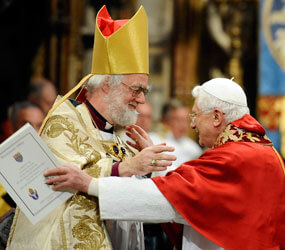LONDON – Pope Benedict XVI and Anglican Archbishop Rowan Williams of Canterbury knelt together before the tomb of an 11th-century Christian king after affirming the need for Catholics and Anglicans to give a united witness to society.
St. Edward the Confessor, who is buried in the Anglicans’ Westminster Abbey, reigned five centuries before English Christians became divided.
The pope and the primate of the Church of England paid homage together to the Christian king Sept. 17 at the end of an afternoon that included public speeches, a 30-minute private meeting and a joint ecumenical prayer service in Westminster Abbey.
Archbishop Williams welcomed Pope Benedict as the first pope ever to visit Westminster Abbey, which was home to a community of Catholic Benedictine monks until 1540 when King Henry VIII dissolved the monastic community.
Beginning in the afternoon with a visit to Lambeth Palace, the archbishop’s residence, the pope told Anglican and Catholic bishops that he did not intend to discuss the difficulties the two communities have encountered on the path toward full unity, but rather to recognize the progress made in ecumenical relations and to encourage closer cooperation for the good of British society.
In his talk to the pope and bishops, Archbishop Williams made similar points, emphasizing particularly the need for Christians to give their neighbors concrete examples of what it means to live a faith- and hope-filled life.
Speaking in the library of Lambeth Palace before having tea with Archbishop Williams and his wife, Jane, Pope Benedict said that over the last 50 years society has grown “ever more distant from its Christian roots, despite a widespread hunger for spiritual nourishment.”
At the same time, he said, the increasingly multicultural and multireligious makeup of modern societies gives Christians a chance to explore with members of other religions “ways of bearing witness to the transcendent dimension of the human person and the universal call to holiness, leading to the practice of virtue in our personal and social lives.”
Still, the pope said, “we Christians must never hesitate to proclaim our faith in the uniqueness of the salvation won for us by Christ.”
The ecumenical events were held just two days before Pope Benedict was scheduled to beatify Cardinal John Henry Newman, a 19th-century theologian and intellectual who began his ministry as an Anglican and later joined the Roman Catholic Church.
Pope Benedict told Archbishop Williams and the others gathered at Lambeth that Cardinal Newman’s vision of the church “was nurtured by his Anglican background and matured during his many years of ordained ministry in the Church of England.”
“He can teach us the virtues that ecumenism demands: On the one hand, he was moved to follow his conscience, even at great personal cost; and on the other hand, the warmth of his continued friendship with his former colleagues” led them to explore the questions they differed on, “driven by a deep longing for unity in faith,” the pope said.
Archbishop Williams told the pope and bishops that in 1845 when Cardinal Newman “finally decided that he must follow his conscience and seek his future in serving God in communion with the See of Rome,” one of his closest Anglican friends “wrote a moving meditation on this ‘parting of friends’ in which he said of the separation between Anglicans and Roman Catholics: ‘It is what is unholy on both sides that keeps us apart.’“
The archbishop said Catholics and Anglicans may not reach full unity quickly, “but no obstacles stand in the way of our seeking, as a matter of joyful obedience to the Lord, more ways in which to build up one another in holiness by prayer and public celebration together, by closer friendship” and by working together to help the poor and to spread the Gospel.
Arriving at Lambeth, Pope Benedict got out of his car with both his arms extended to greet the archbishop, who was waiting with a big smile. The two embraced and kissed each other on both cheeks.
A joint statement issued after the pope and archbishop’s private meeting said, “They affirmed the need to proclaim the Gospel message of salvation in Jesus Christ, both in a reasoned and convincing way in the contemporary context of profound cultural and social transformation, and in lives of holiness and transparency to God.”
It also said, “They agreed on the importance of improving ecumenical relations and continuing theological dialogue in the face of new challenges to unity from within the Christian community and beyond it.”
During evening prayer in Westminster Abbey, which included Methodists and Presbyterians as well as other Christians, the pope said that in a society “increasingly indifferent or even hostile to the Christian message,” Christians must learn how to articulate together the reasons they believe and why faith in Christ fills them with hope.
At the same time, Pope Benedict said, the desire to present a united witness cannot mean that Christians take shortcuts to unity.
“Fidelity to the word of God, precisely because it is a true word, demands of us an obedience which leads us together to a deeper understanding of the Lord’s will, an obedience which must be free of intellectual conformism or facile accommodation to the spirit of the age,” he said.


